19 Mar Best Practices for Translating Official Documents in the UK
When translating official documents in the UK, it’s crucial to use certified translators who are members of recognized bodies like the Institute of Translation and Interpreting (ITI). Accuracy is key, especially for legal or technical terms, so a literal yet contextually appropriate translation is essential. Include a translator’s declaration confirming the accuracy and completeness of the work. Maintain the original document’s format, and consider notarization if required. Ensure cultural sensitivity and confidentiality, particularly for personal or sensitive information. Proofreading and review by another expert are important to avoid errors. Always stay updated on specific legal requirements for government or official use.
1. Use Certified Translators

- Certified translators are essential for official documents like legal contracts, birth certificates, and immigration papers. In the UK, certified translators are often members of recognized organizations like the Institute of Translation and Interpreting (ITI) or Association of Translation Companies (ATC).
- If the translation is for official purposes (e.g., visa applications or court documents), it must be completed by a translator who is qualified and sworn if necessary.
2. Ensure Accuracy
- Literal Translation: In some cases, particularly for legal documents, an accurate and faithful translation is crucial. This means sticking closely to the original text and making sure that nuances are correctly conveyed.
- Contextual Understanding: Ensure that any legal or technical terms are properly translated. Some words or phrases may not have direct equivalents in the target language, requiring the use of an appropriate equivalent that conveys the correct meaning in the legal context.
3. Include a Translator’s Declaration
- Official translations in the UK typically require a translator’s declaration to affirm the translation is accurate and complete. The declaration should include:
- The translator’s qualifications.
- A statement of accuracy and completeness.
- The date and signature of the translator.
- The translator’s contact details.
This ensures that the translation is legally valid and can be used for official purposes.
4. Format the Document Correctly
- Maintain the original format of the document as much as possible, including headings, subheadings, and layout. If there are any special formatting requirements, like for court documents, be sure to follow those closely.
- Notarization: Depending on the nature of the document, some translations may need to be notarized to confirm the translator’s identity and the authenticity of the document.
5. Check for Cultural Sensitivity

- Be aware of any cultural nuances that may affect the translation. This is especially important for documents that involve personal names, places, or other sensitive information.
- Consider that legal systems and terminologies differ between countries, so ensure that the legal terms and phrases used are appropriate for the jurisdiction in which the document will be presented.
6. Confidentiality
- Ensure that the translator maintains confidentiality, particularly for personal, financial, or medical information contained in the official documents. In the UK, confidentiality is especially important in legal translations.
7. Use High-Quality Translation Tools
- While human translators are crucial for accuracy, supporting tools like translation memory software (for consistency in large projects) or terminology databases (for legal terms) can help ensure consistency and quality.
8. Review and Proofreading
- Always proofread and review the translation. Have another qualified translator or expert in the relevant field review the translation, especially if it involves technical, medical, or legal language. This helps to prevent any misinterpretations or errors in the translation.
9. Understand the Purpose and Audience
- Be clear about the intended purpose of the document and who will be reviewing it. Documents intended for official government use (e.g., for immigration or legal purposes) require a different level of formality and precision compared to those used for personal purposes.
10. Stay Updated on Legal Requirements
- Translation requirements may change over time, particularly in terms of what government bodies accept or require. Ensure that you are up-to-date with the specific requirements of institutions like the Home Office, the NHS, or other UK authorities.


No Comments